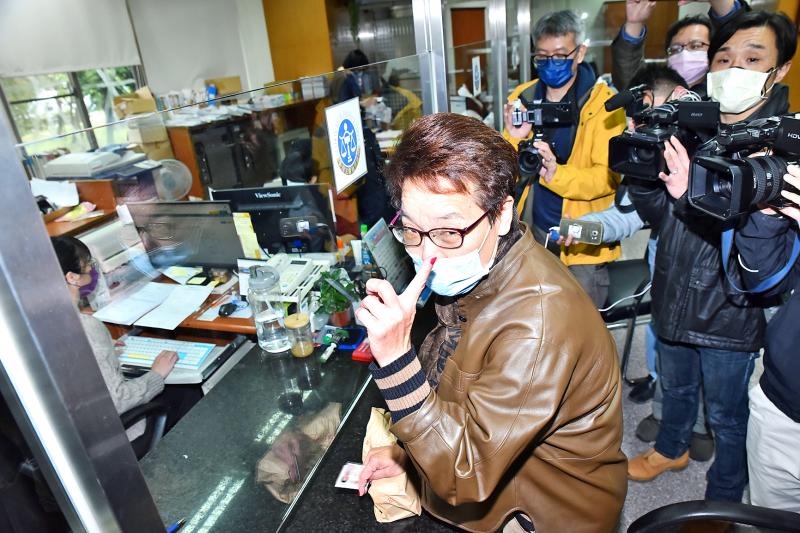Yilan County Commissioner Lin Zi-miao (林姿妙), former Chinese Nationalist Party (KMT) legislator Yang Chi-hsiung (楊吉雄) and two Yilan government officials were yesterday released on bail after being questioned in relation to a corruption case.
An investigation by Yilan prosecutors and the Ministry of Justice’s Agency Against Corruption has named Lin, a KMT member, as a suspect for the alleged possession of assets of unknown origin in connection with property development projects in the county’s Luodong Township (羅東).
Prosecutors told the media following the bail hearing that the judges saw sufficient evidence of Lin’s involvement in the case, but had no need to place her under judicial detention.

Photo: CNA
They released her on bail of NT$800,000 (US$28,690), while Yang and his younger brother were released after posting bail of NT$1.5 million each.
Following questioning, Lin Zi-miao’s son, Lin Yu-tse (林佑澤), was released on NT$2 million bail, while the county government’s Economic Affairs Department section head Lung Fei-chih (龍非池) was released on NT$150,000 bail.
The court released Lin’s daughter, Lin Yi-ling (林羿伶), and the county’s Bureau of Agriculture Director Kang Li-ho (康立和) without bail.
Prosecutors said they are looking at alleged contraventions of the Anti-Corruption Act (貪污治罪條例), which could lead to charges of illegal profiteering by civil servants, along with tampering and destroying evidence, against Lin Zi-miao and the other suspects.
Investigators have examined several property development projects over allegations of profiteering through value-added tax exemptions in 2019, prosecutors said, adding that some aspects of the plans were altered in the following year.
Several millions of New Taiwan dollars were allegedly transferred in and out of a bank account under Lin Zi-miao’s control in the past few years, they said, adding that Lin had increased her wealth and assets to levels far beyond what her salary could allow.
Agency Against Corruption officials and Yilan prosecutors in the middle of last month conducted searches and served summons to more than 30 people for questioning as persons of interest and witnesses in the case. Two officials have since been detained: Yilan County Department of Economic Affairs Acting Director Wu Chao-chin (吳朝琴) and the Department of Agriculture’s Agricultural Affairs Director Wu Tung-yuan (吳東原).
Others taken in for questioning last month included other county officials, along with Luodong Township (羅東) Mayor Wu Chiu-ling (吳秋齡) and former Yilan County councilor Liu Shih-chun (劉石純), both of the KMT.
They also included Lin’s daughter, Lin Yi-lin, and former KMT National Assembly representative for the county Lin Shu-mei (林束梅), who is Lin Zi-miao’s cousin.
Lin Zi-miao did not answer reporters’ questions upon her release yesterday, while Yang said the probe is political persecution against himself, Lin Zi-miao and other officials.
The KMT released a statement accusing the ruling Democratic Progressive Party (DPP) of perverting the justice system as a tool to persecute the opposition and taint KMT politicians ahead of local elections later this year.
DPP Yilan County Chapter director Chen Chun-yu (陳俊宇) said: “KMT officials always decry political persecution when their politicians get implicated in corruption cases, no matter in an election year or not.”
“We ask the judiciary to conduct a thorough probe of Lin Zi-miao’s personal assets of unknown origin, as people want to have a county commissioner with clean ethics, and not use her office to benefit herself and her family,” he said.

Taiwan has received more than US$70 million in royalties as of the end of last year from developing the F-16V jet as countries worldwide purchase or upgrade to this popular model, government and military officials said on Saturday. Taiwan funded the development of the F-16V jet and ended up the sole investor as other countries withdrew from the program. Now the F-16V is increasingly popular and countries must pay Taiwan a percentage in royalties when they purchase new F-16V aircraft or upgrade older F-16 models. The next five years are expected to be the peak for these royalties, with Taiwan potentially earning

STAY IN YOUR LANE: As the US and Israel attack Iran, the ministry has warned China not to overstep by including Taiwanese citizens in its evacuation orders The Ministry of Foreign Affairs (MOFA) yesterday rebuked a statement by China’s embassy in Israel that it would evacuate Taiwanese holders of Chinese travel documents from Israel amid the latter’s escalating conflict with Iran. Tensions have risen across the Middle East in the wake of US and Israeli airstrikes on Iran beginning Saturday. China subsequently issued an evacuation notice for its citizens. In a news release, the Chinese embassy in Israel said holders of “Taiwan compatriot permits (台胞證)” issued to Taiwanese nationals by Chinese authorities for travel to China — could register for evacuation to Egypt. In Taipei, the ministry yesterday said Taiwan

Taiwan is awaiting official notification from the US regarding the status of the Agreement on Reciprocal Trade (ART) after the US Supreme Court ruled US President Donald Trump's global tariffs unconstitutional. Speaking to reporters before a legislative hearing today, Premier Cho Jung-tai (卓榮泰) said that Taiwan's negotiation team remains focused on ensuring that the bilateral trade deal remains intact despite the legal challenge to Trump's tariff policy. "The US has pledged to notify its trade partners once the subsequent administrative and legal processes are finalized, and that certainly includes Taiwan," Cho said when asked about opposition parties’ doubts that the ART was

If China chose to invade Taiwan tomorrow, it would only have to sever three undersea fiber-optic cable clusters to cause a data blackout, Jason Hsu (許毓仁), a senior fellow at the Hudson Institute and former Chinese Nationalist Party (KMT) legislator, told a US security panel yesterday. In a Taiwan contingency, cable disruption would be one of the earliest preinvasion actions and the signal that escalation had begun, he said, adding that Taiwan’s current cable repair capabilities are insufficient. The US-China Economic and Security Review Commission (USCC) yesterday held a hearing on US-China Competition Under the Sea, with Hsu speaking on